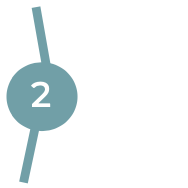
Neuro – hormonal balance
Hormones and autonomic nervous system
The proper functioning of the endocrine system is closely linked to the functioning of the autonomic nervous system, which is why we speak of a neuro-hormonal system. It is a very important network of regulatory processes that also provides the first reactions to stress. The hormonal component consists of various hormone glands that release their messenger substances into the blood. This means a certain slowness in the stimulus transfer. Nerve pulses (electrical signals) and various neurotransmitters play a crucial role in the autonomic nervous system. These processes work quickly. Within the autonomic nervous system we distinguish the parasympathetic, the (ortho)sympathetic part and the nervous system of the intestines (enteric nervous system).
THE PARASYMPATIC NERVOUS SYSTEM IS THE STRESS BRAKE
Hormones and nervous system
Hormones and nervous system
The parasympathetic nervous system regulates, among other things, the recovery and energy reserves in the body. It also regulates the degree of stress response and thus the functioning of the autonomic nervous system (AZC) is primarily under the control of the parasympathetic branch. That is why we also speak of the ‘vagal brake’. About 75% of all parasympathetic nerves are part of the 10th cranial nerve, the Vagus nerve. Acetylcholine and nor-adrenaline are the most important neurotransmitters within the AZC. The sympathetic branch of the AZC is responsible for the control of all processes in case of stress, therefore it causes energy production, heart rate acceleration, blood pressure increase, increase in glucose concentration in the blood, increase in muscle strength, etc.
The functioning of AZC and in particular the role of the parasympathetic branch (vagal brake) can be scientifically determined with a multi-day analysis of the Heart Rate Variability. In this way, both the amount and the quality of the recovery can be measured, especially at night, when recovery is a crucial factor.

HORMONES CAN SORT BOTH A FAST AND A SLOW EFFECT
Hormones – large diversity
There are three categories of hormones:
Hormones bind to receptors to produce an effect. These receptors can be located on the membrane (fast acting), for example (catecholamines, peptide hormones), acting intracellularly (slower effect), for example testosterone, estrogens, cortisol or acting nuclear (very slow effect), interacting with DNA such as T3/T4 hormones.
The regulation of hormone secretion occurs in the brain in three ways.
WE GLADLY EXPLAIN HOW A HAIR MINERAL ANALYSIS CAN DETERMINE THE ANDRENAL FUNCTIONING
A LITTLE STRESS IS OK BUT NO RECOVERY WILL RESULT IN A BURN-OUT
Autonomic nervous system
In a stressful situation, the stress hormones adrenaline and noradrenaline are secreted. This makes your heart beat, your breathing accelerates immediately, the muscles are tensed to walk and other sensory perceptions are increased. Digestion is also temporarily stopped. You pushed the accelerator, as it were. After a few minutes, a second system comes into operation. The pituitary gland will direct the adrenal glands to produce cortisol. Cortisol raises blood sugar levels and speeds up metabolism. This releases more energy to deal with the stressful situation.
The parasympathetic system brings the body back to rest. The brake pedal is pressed causing your heart rate to decrease, breathing becomes deeper and slower, muscle tone decreases, you sweat less and blood vessels widen, increasing blood volume and body temperature and directing blood less to the muscles and more to organs that play a role in digestion. The emotions also calm down.
Many western diseases are partly caused by the disruption of the balance in the autonomic nervous system. The regulatory role of the parasympathetic branch decreases (decrease in braking function), there is less and less recovery and the quality of the recovery decreases, the sympathetic influence increases disproportionately and at the wrong times.
Anxiety, depression, stress, chronic muscle tension, heart problems, sleeping problems and high blood pressure are common consequences.

We hebben diverse analysemethoden voor u om zo een nauwkeurig beeld te krijgen van de gezondheid van uw cliënten. Met de vragenlijsten in het MyHealth Platform heeft u extra tools om zo een nog betere en gerichtere diagnose te kunnen stellen. Vraag ons naar de mogelijkheden die bij u en uw praktijk passen.
SEE WHICH OTHER REGULATION PROCESSES ARE RESPONSIBLE FOR OUR MENTAL AND PHYSICAL HEALTH

